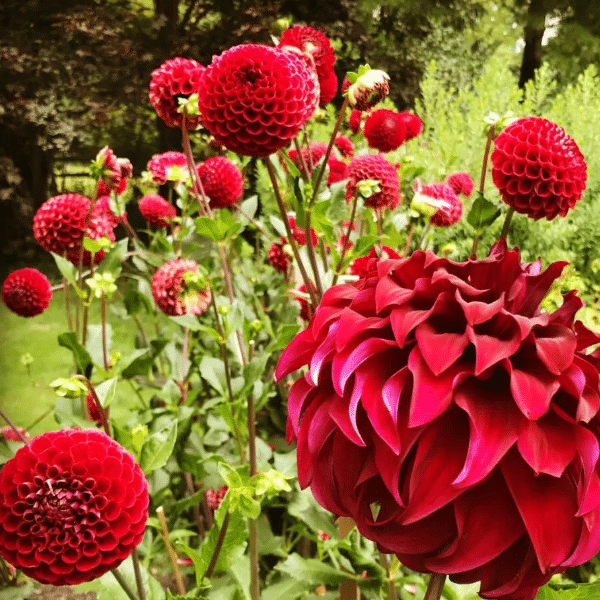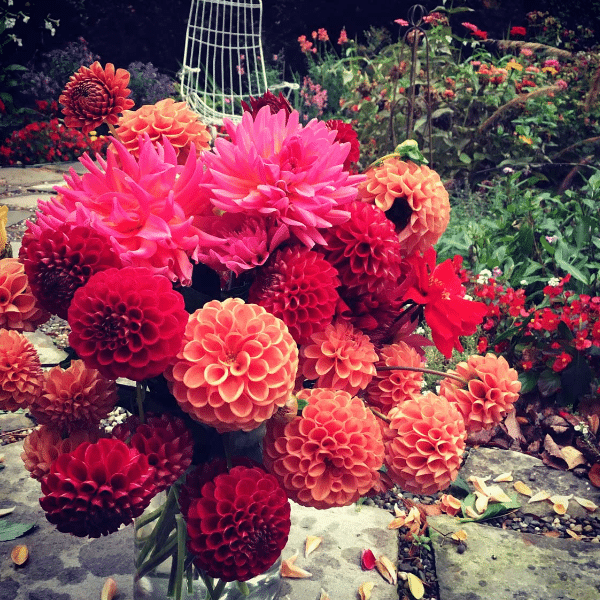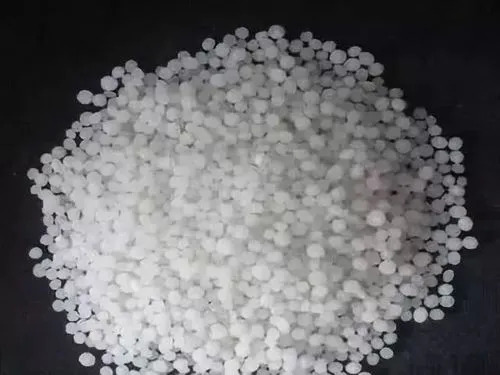Introduction to Organic Fertilization for Dahlias
Choosing the most fitting organic fertilizer for dahlias is important for any gardener who wants their flowers to bloom brightly and healthily. Dahlias are colorful and have attractive petals thus they need specific nutritional support in order to grow well. It cannot be overemphasized how significant it is to select the right type of fertilizer because this affects directly on flower quality, plant health as well as blooming duration.
Organic fertilizers are better than synthetic ones in many ways. To start with, they come from natural sources which makes them environmentally friendly and helps maintain soil structure naturally. “Organic fertilizers release nutrients slowly, matching dahlia’s growth requirements without risking over-fertilization that can harm both plants and soils’’ Dr Helen Tostengard said. This slow release provides not only continuous supply of nutrients but also reduces nutrient leaching hence promoting healthier roots systems leading to stronger plant growth.
Besides; organic fertilizers also improve soil fertility by increasing its content of organic matter necessary for good microbial activity within it. These microorganisms play a vital role in breaking down organic materials into forms usable by dahlias hence supporting their flourishing. Moreover using such products creates ecosystems friendliness through fostering higher biodiversity levels within gardens which may attract useful insects while reducing pests naturally.
By beginning with organic fertilizer application we nurture our dahlias as well as contribute towards sustainable gardening practices that recognize and work with nature.
Key Ingredients in Organic Fertilizers for Dahlias
When caring for dahlias understanding what comprises the best organic fertilizer for dahlias is crucial. The composition of nutrients present in these fertilizers greatly affects plant growth and wellbeing. Therefore an appropriate NPK ratio should be used during feeding so as to ensure optimum dahlia performance.
Nitrogen serves as building block needed mainly by leaves stems though it can also support overall greenness of foliage hence making them look lushous . Phosphorus helps form strong roots systems and enhances colorfulness among flowers while potassium boosts general disease resistance capability besides enabling plants utilize nutrients effectively as well. “The NPK ratio should be specific for dahlias in order to provide them with necessary nutrients at different stages of their growth which is very important for blooming and long life” according to Dr Elaine Foster an Agricultural Scientist.
Apart from these primary minerals there might be other helpful elements contained within organic manure that foster healthy growth of dahlias. Calcium is essential for cell wall structure integrity magnesium activates enzymes needed during photosynthesis while sulfur aids in chlorophyll synthesis. Such minerals not only promote development but also strengthen against adverse environmental conditions.
Though they are required less frequently trace metals like iron, manganese, zinc copper boron molybdenum nickel play significant roles too . These support various physiological functions such as nitrogen fixation, resistance diseases ensuring maximum potentiality of dahlia’s growth.
Therefore using organic fertilizers containing these essential trace elements together with the necessary nutrients can greatly transform the healthiness and vibrancy of your dahlias leading to more magnificent floral displays.

Top Suggested Organic Fertilizers for Dahlias
To choose the most suitable organic fertilizer for dahlias we need to know which products on the market give these flowers maximum advantage. Several organic fertilisers are good for dahlias, each providing a different mix of nutrients specifically designed for these plants.
Among gardeners’ favorite picks is fish emulsion, known for its quick nutrient release and high nitrogen content. It fosters a healthy vegetative growth stage in dahlias by helping them establish strong foundations for later blooms. Bone meal is another highly recommended product that contains phosphorus essential during flowering; it supports root development ensuring vigorous growth while producing vibrant and abundant dahlia flowers.
For dahlia lovers seaweed extract also counts among popular choices when it comes to organic fertilizers because apart from having a well-balanced NPK composition, this type of fertilizer also has trace elements and plant hormones that enhance healthy growth as well as flower color and size improvement. According to gardening expert Emily Ford: “Seaweed extract acts like an all-round supplement for dahlia plants offering many different nutrients together with bioactive compounds helpful in improving quality of flowers produced and their resistance against diseases.”
A homemade mixture can be very effective too especially if you want to create your own fertilizer blends as suggested by some gardeners who have been successful at growing healthy dahlias using such methods. In this case, composted manure with high organic matter content could be mixed together with green composts like coffee grounds or crushed eggshells which provide slow-release nutrition able to feed soil continuously throughout various stages of dahlia development.
Some DIY recipes may include:
- Composted chicken manure: With its richness in nitrogen, it works great during early growth phases.
- Green compost mix (coffee grounds plus crushed eggshells): This gives gentle nutrient release that would sustain nourishment over time.
- Wood ash: It supplies potassium while raising soil PH, thus reducing acidity levels especially in regions with acidic soils.
By incorporating these organic fertilisers into our gardening routine, we can ensure our dahlias get the best possible care, which will result in healthy plants and beautiful flowers all season long.
Application Pointers: The How and When of Fertilizing Dahlias
Understanding the best organic fertilizers for dahlias is important. However, this knowledge becomes significant when one knows how to apply these manures correctly since it can affect the health and quality of blooms produced by such flowers greatly. Below are some expert tips on fertilizing dahlia plants.
When to Fertilize:
The most appropriate time for fertilization in dahlias is just before they begin their active growth stage in spring. Another round should be applied right after they start setting buds, usually around early summer. This timing ensures that nutrients are available when required by plants for growth and development of blossoms.
How to Apply Fertilizer:
- Soil Preparation: Integrate organic fertilizer into the soil before planting dahlia tubers by mixing it with the top 6-8 inches using a garden fork or tiller.
- Direct Application: For established plants, apply around the base ensuring not to touch stems or leaves as this may burn them but rather should be spread around the plant evenly, also known as side dressing. Water immediately after application so that it can seep deeper into the ground through the root zone where absorption takes place more effectively.
- Watering Regularly: Consistent moisture supply is necessary throughout the growing cycle, especially after feeding has been done therefore consider watering frequently. Organic fertilizers need water activation which releases nutrients into the soil making them available for uptake by roots.
Seasonal Schedule Of Fertilization:
- Spring Time: Apply a balanced organic fertilizer when new shoots emerge from the old stem.
- Early Summer Period: Use a phosphorus-rich type at the stage of bud formation so as to enhance the production of big, healthy flowers.
- Throughout the Growing Season: Apply light amounts frequently instead of heavy doses once in a while because continuous growth and flowering require sustained nourishment.
Healthy vibrant dahlias can be achieved if these application procedures are followed alongside adhering to specific types applicable during different stages within one year. It must be kept in mind that overfeeding can cause harm thus rates and frequencies must be observed.

Monitoring and Modifying the Fertilization of Dahlias
Efficiently employing the top-notch organic fertilizer for dahlias calls for good application technique, as well as constant evaluation of the health of plants and soil conditions. This continuous assessment allows gardeners to make informed choices about changing fertilizers to optimize plant growth and flower quality.
Indications of Poor Nutrient in Dahlias:
- Yellowing on Leaves: This is commonly due to lack or low amounts of nitrogen. Good leaf formation and general welfare require enough nitrogen provision from any source.
- Flower Buds Not Developing: The reason being it could be having no phosphorous thus making such buds weak. Adequate phosphorous is necessary for correct floral development.
- Stunted Growth and Weak Stems: Potassium deficiency may be the cause. Potassium is vital in strengthening plant cells that aids in proper growth.
How to Adjust Fertilizer Based on Plant Response:
- Increase Nitrogen Supply: In case your dahlia has yellow leaves or stunting, increase the nitrogen levels in your mix of manure components.
- Increase Phosphorus Levels: Ensure your fertilizer has enough phosphorous ratio required for better blossom development.
- Increase Potassium Intake: Whenever there is a potassium deficiency that comes with poor stem strength, use a high potassium fertilizer to supplement your plants’ nutritional requirements.
Regular soil testing can also give insight into nutrient levels to help gauge specific needs for dahlias. These tests should form the basis upon which you modify your fertilization program, thus making it effective concerning nutrition management resulting in healthier plants.
By carefully monitoring their health and modifying fertilization accordingly, gardeners can ensure that their dahlias get an appropriate nutrient balance. This keen attention will result in more vibrant blooms and a flourishing garden.
Case Studies and Success Stories
The employment of the finest natural plant food for dahlias is not just a hypothesis; most farmers have recorded positive results as they introduce such products into their gardening practices. The following are some real-life stories about organic fertilizers on dahlias that show what happened before and after people started using them.
Local Community Garden
In a local community garden during the middle of the growing season, gardeners shifted to an organic fertilizer made from seaweed for their dahlias. Before then, there was modest growth in the dahlias with few blooms on it. The plants demonstrated significant improvement in both number and size of flowers when this organic fertilizer was applied. “Swapping to an organic fertilizer not only brightened up our Dahlias but also increased overall yield by 30% plus over previous year,” said a coordinator at the garden.
Professional Dahlia Grower
A professional dahlia grower who specializes in competitive flower shows began employing a mixture of composted chicken manure as well as green compost prepared at home for his or her dahlias. This yielded incredible outcomes. Prior to these developments, while already beautiful, these flowers had weak stems and occasional pests that affected them quite often. After embracing this form of organics blend, several awards were won by the dahlias because they were strong and bloomed exquisitely. “Organic means have improved my flowers’ look and health towards pest attacks,” noted a grower.
Home Gardener
A gardener at home revealed that changing primary fertilizers to bone meal and fish emulsion improved soil quality along with blooms of dahlias too.“I’ve never seen my Dahlias healthier than they are now, even the soil has more life in it.It retains water longer too; I don’t see much weed either.I simply love how those things blossomed” he told me.This provides additional proof that using purely organic fertilizers contributes productively to plant and soil health promoting sustainable environment for cultivation.
Conclusion
To start with, the foremost step to take for a healthy and vibrant dahlia entails choosing the best organic fertilizer for dahlias. Organically applied fertilizers have great effects on dahlia flowers in general and the ecological system of gardens as demonstrated by multiple case studies and success stories. It is possible for gardeners to have more colorful blooms while aiding in a healthier environment through the incorporation of these fertilizers.
Final Recommendations for Dahlia Enthusiasts:
- Choose Wisely: Choose an organic fertilizer that will be most suitable for your dahlias, depending upon their needs, especially when they are about to bloom, go for those rich in phosphorus.
- Apply Correctly: To avoid any damage to plants, follow proper application methods and adjust quantities so as not to over-fertilize.
- Observe and Adjust: Observe soil conditions regularly; check plant healthiness so that you can correct any incorrect fertilizing practices made.
In conclusion, using organic fertilizers on dahlia flowers enhances the aesthetics and well-being of these blossoms while promoting eco-friendly gardening. For example, regular use of organically grown plants leads to significant improvements in flower displays and overall garden health, whether one is a new or experienced gardener.
Here are some references about the best organic fertilizers for dahlias :
- PubMed: This comprehensive database includes various scientific studies and articles that could contain information about organic fertilizers and their effects on plant health. You can search for specific studies related to dahlias and organic fertilizers.
- My HealtheVet – VA: While primarily a health resource, this site sometimes includes information on gardening as a therapeutic activity, which could extend to organic gardening practices.







